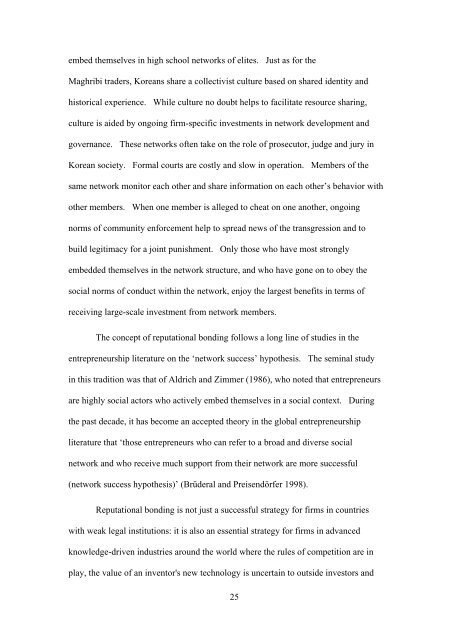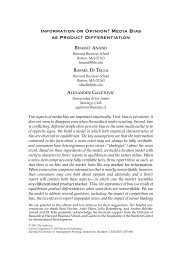Social Dimensions of Entrepreneurship. - People. hbs .edu ...
Social Dimensions of Entrepreneurship. - People. hbs .edu ...
Social Dimensions of Entrepreneurship. - People. hbs .edu ...
You also want an ePaper? Increase the reach of your titles
YUMPU automatically turns print PDFs into web optimized ePapers that Google loves.
embed themselves in high school networks <strong>of</strong> elites. Just as for the<br />
Maghribi traders, Koreans share a collectivist culture based on shared identity and<br />
historical experience. While culture no doubt helps to facilitate resource sharing,<br />
culture is aided by ongoing firm-specific investments in network development and<br />
governance. These networks <strong>of</strong>ten take on the role <strong>of</strong> prosecutor, judge and jury in<br />
Korean society. Formal courts are costly and slow in operation. Members <strong>of</strong> the<br />
same network monitor each other and share information on each other’s behavior with<br />
other members. When one member is alleged to cheat on one another, ongoing<br />
norms <strong>of</strong> community enforcement help to spread news <strong>of</strong> the transgression and to<br />
build legitimacy for a joint punishment. Only those who have most strongly<br />
embedded themselves in the network structure, and who have gone on to obey the<br />
social norms <strong>of</strong> conduct within the network, enjoy the largest benefits in terms <strong>of</strong><br />
receiving large-scale investment from network members.<br />
The concept <strong>of</strong> reputational bonding follows a long line <strong>of</strong> studies in the<br />
entrepreneurship literature on the ‘network success’ hypothesis. The seminal study<br />
in this tradition was that <strong>of</strong> Aldrich and Zimmer (1986), who noted that entrepreneurs<br />
are highly social actors who actively embed themselves in a social context. During<br />
the past decade, it has become an accepted theory in the global entrepreneurship<br />
literature that ‘those entrepreneurs who can refer to a broad and diverse social<br />
network and who receive much support from their network are more successful<br />
(network success hypothesis)’ (Brüderal and Preisendörfer 1998).<br />
Reputational bonding is not just a successful strategy for firms in countries<br />
with weak legal institutions: it is also an essential strategy for firms in advanced<br />
knowledge-driven industries around the world where the rules <strong>of</strong> competition are in<br />
play, the value <strong>of</strong> an inventor's new technology is uncertain to outside investors and<br />
25
















